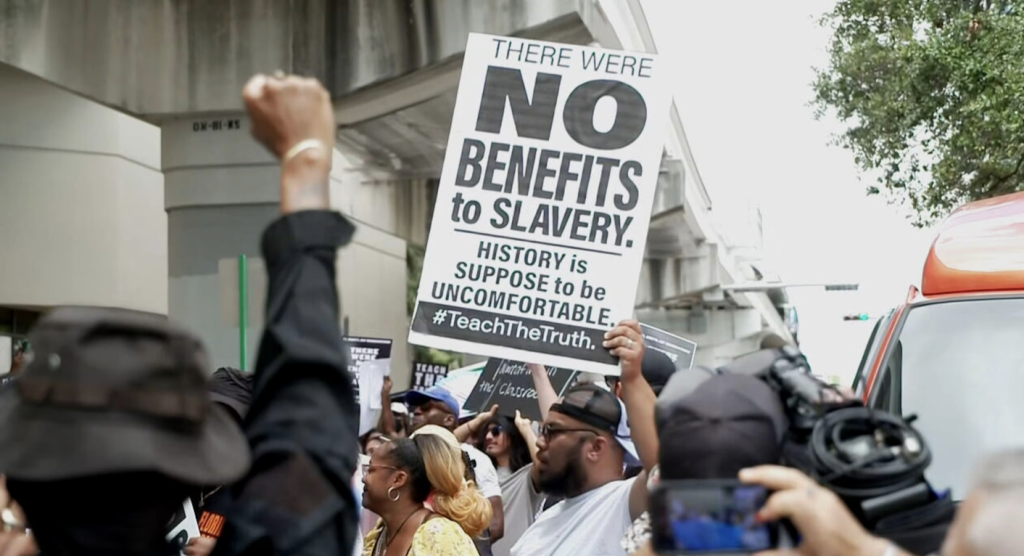We cannot be free until they are free.
James Baldwin, Collected Essays, 295.
Given the recent revitalization of efforts to whitewash United States history, James Baldwin’s commentary on mid-twentieth century race relations, especially as documented during his travels throughout the South, is ever relevant. Perhaps most egregiously, Florida’s new teaching standards include instruction on “how slaves developed skills which, in some instances, could be applied for their personal benefit” (Atterbury “New Florida teaching standards say African Americans received some ‘personal benefit’ from slavery”). Florida is joined by over 11 other states, predominantly located in the South, that have enacted restrictions on teaching the long (and enduring) history of racism with the intent to avoid making (White) students feel guilty for their race.
In my own conversations with friends and family about these very pieces of legislation, I often hear some variation of the phrase “I am not responsible for what my ancestors did” in response. Likely a result of my strong aversion to any form of confrontation, especially with loved ones, and despite my wholehearted belief in the necessity of learning the complete and unfettered history of the United States, I have always struggled to enunciate a compelling counter to their protests. For this reason, I found James Baldwin’s “My Dungeon Shook” especially useful. In this essay, Baldwin redefines our understanding of accountability, offering a new perspective on what it means for White people to acknowledge and own their responsibility and contributions to the oppression of Black people. On the centennial anniversary of the passage of the Emancipation Proclamation, Baldwin writes to his nephew James, “You know, and I know, that the country is celebrating one hundred years of freedom one hundred years too soon. We cannot be free until they are free” (295). This freedom, Baldwin argues, is contingent on love; in this same text, he calls on Black Americans to “with love, force our brothers to see themselves as they are, to cease fleeing from reality and begin to change” (294). Yet, 80 years later in 2023, the White majority continues to flee from this reality via the aforementioned attacks on school curriculums, continuous acquittals of police brutality, and more.

Sure, maybe White people are not to blame for what their ancestors did. But we are certainly presently guilty should we continue to turn a blind eye and exhibit indifference while the pain and denigration of our Black peers, coworkers, professors, friends, and bosses are not only overlooked but erased altogether. As Baldwin emphasizes in “My Dungeon Shook,” we cannot move forward towards a true future of racial equality and national brotherhood without first knowing, understanding, and acknowledging our past. Without doing so, White people, let alone Black people, are not free, to use Baldwin’s language, to be part of this path forward. We have a duty to run to this dark history, not from it.

Your response made me think of so many relevant things. I found similarities between the concept of “white guilt” that you mention is being used to override African American history from being taught in certain schools and the recent strike down of affirmative action and the decision to not include race as a factor when admitting students into higher education. I also thought of Frederick Douglass’s infamous speech “What to the Slave if the Fourth of July” when you included the quote Baldwin says to his nephew about our country celebrating one hundred years of freedom, one hundred years too soon. Overall, all of these things have one thing in common which is the whitewashing that America does to cover our issues with race relations in America. Black people are not truly free like American “advertises” that they are and although white people make it seem as though they are so inclusive and are still making efforts to seek out diversity and equality in society, examples like Florida’s new teaching standards and the decision with affirmative action prove otherwise.
One last thing that I want to say is that I enjoyed reading about your personal involvement with discussions like this. I agree that sometimes it is difficult to have family members and friends understand what is really going on in society, but like you said Baldwin’s piece “My Dungeon Shook: A Letter to My Nephew” is definitly useful to providing others with a better perspective on understanding accountability.
I couldn’t agree more with your conclusion about the role White people still have in modern struggles for equality. Responsibility and accountability are incredibly important, yet people don’t seem to understand that they are being asked to be responsible for their own actions, not those of their ancestors. It is an inherently guilty response and Baldwin is spot-on with identifying the lengths with which the White community will go to to justify, qualify, or lessen its guilt. I’m glad you brought the Florida debacle into this as well, it is such a blatant example of attempting to rewrite history out of discomfort, which America has already done incredibly well for a long while. I think a lot of the panic around Critical Race Theory and teaching history is manufactured though, and a manipulation of that guilt from those in power. Only by overcoming that guilt and having honest conversations will the manipulation cease to be effective.